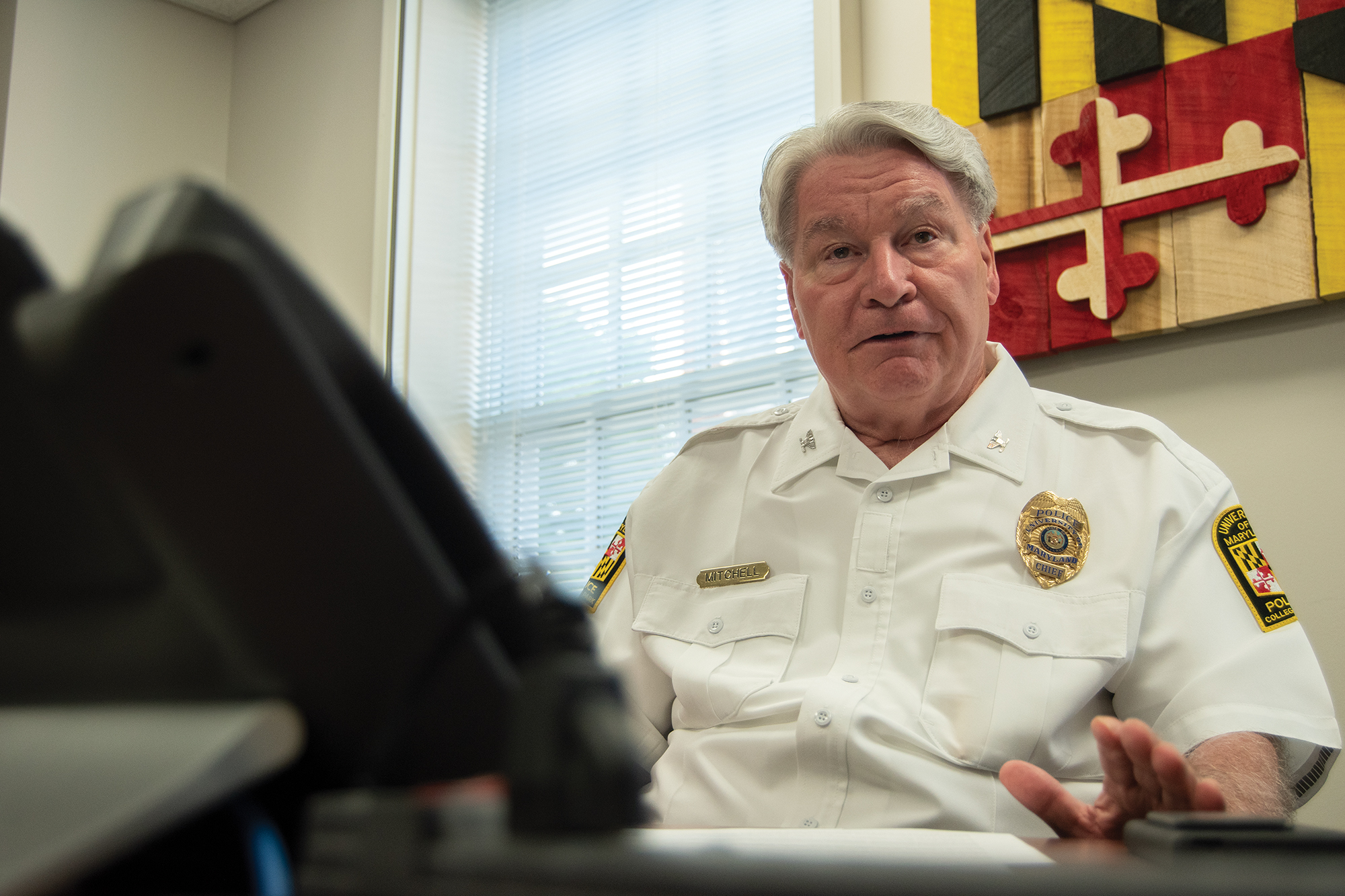The University of Maryland Police Department will be returning military-grade weapons acquired through the federal government’s 1033 program, Chief David Mitchell said.
The department’s participation in the program, which provides surplus weapons from the Defense Department, gave university police rifles, an armored truck and two Humvees. It fell under criticism in June as more than 1,000 people petitioned to demilitarize University Police.
University President Darryll Pines announced the decision to divest on his first day in office, July 1.
The program itself has become what Mitchell called a “lightning rod” in the conversation of police reforms nationwide and on this campus. The department has heard many complaints from the community about the program, Mitchell said.
“We have heard our community say: ‘We don’t want you all to have military surplus equipment,’” Mitchell said. “We’ll have none. Zero.”
The department was already in the process of returning some equipment, including 25 5.56-millimeter rifles, 16 12-gage shotguns and an armored truck, Mitchell told The Diamondback in June.
Joining these returns will be 62 reflex sights, 17 rear sights, 50 5.56 millimeter rifles, two 7.62 rifles used for ceremonies by the Honor Guard and 300 magazine cartridges, Sgt. Rosanne Hoaas wrote in an email. Additionally, two Humvees are being sold, because they are no longer on the 1033 inventory, Hoaas wrote.
The rifles from the program will be replaced by a “more modern” police rifle which is used by Montgomery and Prince George’s county police, Mitchell said. The replacements are semi-automatic, instead of automatic, and are ergonomically different, said Lt. David Fields, who works in this university’s police department.
[UMD students and alumni petition for reform of policing on campus]
The department will replace the rifles because they needed an upgrade and did not want the association to the 1033 program, Mitchell said.
Many communities have been undergoing the same process of divesting from the 1033 program. The move to divest from the program has become so widespread that UMPD has to wait in line to return the equipment, Fields said.
Mitchell discussed the scrutiny of the 1033 program and the turmoil surrounding police reforms due to recent protests as “the toughest times in [his] career.” Mitchell expressed his anger and frustration over the death of George Floyd, a Black man who was killed by Minneapolis police, and emphasized that events like these highlight the importance of police’s interactions with the community.
Listening to the community is essential to the department’s policing policies, he said. The department actively seeks out student voices by reading petitions and meeting with the SGA and other student groups, Mitchell said.
Dan Alpert, Student Government Association president, said Mitchell and University Police have been responsive to student voices.
The SGA released a plan earlier this month to reform policing on the campus, which Alpert hopes will guide future conversations with the department, he said. The “Roadmap to Campus and Policing Reform” was created with attention to student concerns, university research and conversations with campus administrators, Alpert said.
[UMD professors discuss racism on campus, consider policing reform at town hall]
Balancing student needs and campus safety can be difficult, Alpert said. And Mitchell agreed, citing his concerns about the police department needing the relinquished equipment in case of emergencies.
Mitchell emphasized that the community should manage their expectations of the police and should be knowledgeable of how police handle emergency situations.
“I think it’s very important for people to educate themselves about that. What exactly do you expect us to do, and do it with what?” Mitchell said.
An active shooter situation is one where “needing the right equipment” is important, he said. But the equipment that would be used in that case — like an acoustic gunshot detection system or a ShotSpotter system — did not come from the 1033 program.
The majority of the equipment being returned to the 1033 program was not used frequently, Mitchell said. The Humvees were used in emergency weather situations to transport troops to and from the campus, and the shotguns have been used to put down animals with no hope of surviving, like an injured deer, Mitchell said. The rifles have not been fired on the campus, Mitchell said.
Despite his concerns, Mitchell said it’s not worth participating in the program if students are against it.
The divestment decision has led to other conversations regarding police reform, Alpert said.
Pines announced the creation of a task force that will be aimed at enhancing community policing and building trust with the university community. It could result in the adjustment of some of the department’s policies, Mitchell said. Other organizations will work with the police department as well — the SGA will join the university’s Residence Hall Association and the police department in continuing conversations about police reform, Alpert said.
Some policies to limit the use of excessive force were already in place, such as “8 Can’t Wait” — eight policing policies that call for officers to de-escalate situations and warn suspects before shooting, after exhausting all other options. The department has also never permitted chokeholds, Mitchell said.
“We really didn’t have to change much there, except to say this is who we are and this is what we do,” Mitchell said. “But not all police departments are like that.”



